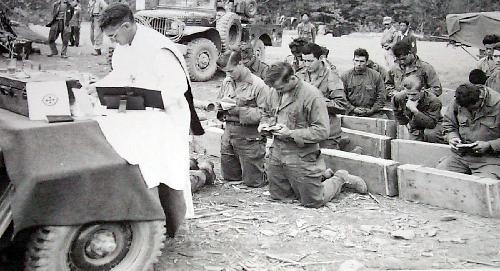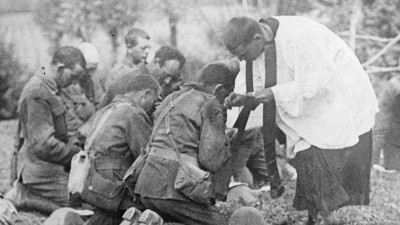Nothing shalt thou have to fear

At the Stational Church
Originally, the forty days of Lent were counted from this Sunday. In Rome, the stational church is the basilica of Saint John Lateran, which was originally dedicated to the Most Holy Saviour. The very name “Most Holy Saviour” condenses in a single phrase the whole work of Redemption into which we enter, sacramentally, once again, today. It is beneficial, throughout Lent, to pay attention to the Roman stational churches designated for each day: very often the key to understanding the Masses of Lent is found in the title of the stational church. You will find them indicated in your missal.
Into the Fray
Straightaway after His holy baptism in the Jordan, the Most Holy Saviour enters upon his combat with the powers of darkness. Today begins the combat that will reach its highest point in the Sacred Triduum. This is the combat of which we shall sing in the sequence on Easter Day:
Death and life contended
in a spectacular battle:
the Prince of life, who died,
reigns alive.
The Weapons of the Enemy
The ancient enemy still attacks with the same weapons that he has used against man from the beginning: lies, deceptions, and empty promises. Saint John, in his first epistle, identifies these things for us:
Love not the world, nor the things which are in the world. If any man love the world, the charity of the Father is not in him. For all that is in the world, is the concupiscence of the flesh, and the concupiscence of the eyes, and the pride of life, which is not of the Father, but is of the world. And the world passeth away, and the concupiscence thereof: but he that doth the will of God, abideth for ever. (1 John 2: 15–17)
Concupiscence of the Flesh
Satan tempts by appealing to the flesh: eat this thing, feel this thing, enjoy this pleasure. This is the concupiscence of the flesh: “If it feels good, I have a right to it, I must have it”. Satan hates chastity and seeks, by every means, to belittle it, to present it as something unnecessary, as an obstacle to happiness, an impediment to enjoying a fully human life.
Pride of Life
Satan tempts by appealing to man’s drive to assert himself, to be autonomous, to grasp after power and control. This is the pride of life: “I am my own man, the master of my destiny, I am self–sufficient. No one can tell me what to do. I will do things my way». Satan hates humility and seeks, by every means, to turn souls away from it. “Why lower yourself? Why obey? You can have a perfectly good life without submitting your will to anyone else. Do as you please. You need no one and nothing outside of yourself”.
Concupiscence of the Eyes
Satan tempts by appealing to man’s desire to possess, to claim ownership, to accumulate things. This is the concupiscence of the eyes: “If I see something that I fancy, I must have it. This is mine, and that is mine. I need deny myself nothing”. Satan hates detachment from things, and seeks, by every means, to convince souls that things will make one happy: “You need this thing. Why deny yourself something that will make you look smarter, or more fashionable? Why go without something that will make you feel more comfortable, or more secure, or more powerful?”
With the Word of God as Weapon
Our Lord counters Satan’s threefold temptation with the sword of the Spirit (Ephesians 6:17), the two–edged sword of the Word of God (Hebrews 4:12). Jesus draws forth from the Psalms precisely the right weapon; He answers Satan’s deceptions with the shining truths of Psalm 90:
Content if thou be to live with the most High for thy defence, under his Almighty shadow abiding still, him thy refuge, him thy stronghold thou mayst call, thy own God, in whom is all thy trust. He it is will rescue thee from every treacherous lure, every destroying plague. His wings for refuge, nestle thou shalt under his care, his faithfulness thy watch and ward. Nothing shalt thou have to fear from nightly terrors, from the arrow that flies by day-light, from pestilence that walks to and fro in the darkness, from the death that wastes under the noon. Though a thousand fall at thy side, ten thousand at thy right hand, it shall never come next or near thee; rather, thy eyes shall look about thee, and see the reward of sinners.
He, the Lord, is thy refuge; thou hast found a stronghold in the most High. There is no harm that can befall thee, no plague that shall come near thy dwelling. He has given charge to his angels concerning thee, to watch over thee wheresoever thou goest; they will hold thee up with their hands lest thou shouldst chance to trip on a stone. Thou shalt tread safely on asp and adder, crush lion and serpent under thy feet.
The Great Lenten Psalm
Psalm 90 is the great Lenten psalm, the perfect prayer for this time of spiritual warfare with the world, the flesh, and the devil. It is the prayer that will shield us from the poisonous darts of the enemy who seeks to bring us down. It is the means by which the whole Church, and the soul of each believer, are united to the prayer of the Most Holy Saviour and to His victory. Without counting the references to it in the Gospel itself, Psalm 90 occurs no less than five times in today’s Mass — in the Introit, Gradual, Tract, Offertory, and Communion. Psalm 90 is is clearly the great prayer of the day; it is the Church’s principal Lenten meditation. By placing Psalm 90 on the First Sunday of Lent, the Church would have us understand that it contains all that is needed for us to complete the Lenten journey.
Not As the World Sees
Saint Paul, in the Epistle (2 Corinthians 6:1–10), tells us what to expect during this Lent. The world, he says, will see you as deceivers; God and His Angels will see you as faithful to the truth. The world, he says, will see you as dying; God and His Angels will see you as alive in Christ. The world, he says, will see you as chastised; God and His Angels will see you as favoured by grace. The world, he says, will see you as a sorry lot; God and His Angels will see you as always rejoicing. The world, he says, will see you as needy and deprived of life’s good things; God and His Angels will see you as rich in supernatural treasures and enriching many. The world, he says, will see you as having nothing; God and His Angels will see you as possessing all things.
The Father’s Promises
What does the Father say to us today? He speaks to each of us as He spoke to His Christ. «Hope in me», says the Father, «and I will deliver you: I will protect you because you know my name. You shall cry to me, and I will hear you: I am with you in tribulation, I will deliver you, and I will glorify you. I will fill you with length of days; and I will shew you my salvation». (Psalm 90:14–16)
 Before Combat
Before Combat
Today’s Holy Mass is like those dramatic Masses once celebrated for soldiers in wartime just before a decisive battle. Today we are equipped with the Word of God and, in it, we will find all that is needed for the battle.
Put you on the armour of God, that you may be able to stand against the deceits of the devil. For our wrestling is not against flesh and blood; but against principalities and power, against the rulers of the world of this darkness, against the spirits of wickedness in the high places. Therefore take unto you the armour of God, that you may be able to resist in the evil day, and to stand in all things perfect. (Ephesians 6:11–13)
To the Altar
The Word of God alone is not enough: the Word sends us to the Altar. The Holy Sacrifice of the Mass is the fulfilment of every holy preaching of the Word. It is the Word Himself who commands, «This do for the commemoration of me» (1 Corinthians 11:24). Today we are given the very Body and Blood of the Most Holy Saviour, without which no man can withstand the assaults of the powers of darkness. The Most Holy Eucharist is the food of victors; it is the Hidden Manna; it is the assurance of the final triumph; it is the foretaste of the marriage supper of the Lamb (Apocalypse 19:9). Behold, now is the acceptable time, behold now is the day of salvation (2 Corinthians 6:2).
The Mystery of Salvation
In forty days time, cleansed from all that is old, we shall emerge from the combat stupendous of the Most Holy Saviour and, through Him, with Him, and in Him, pass over into the mystery of salvation and into newness of life.
